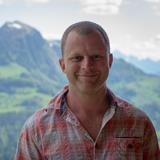Unusual: Refurbishing an Old Business Model for a Sustainable Future
Implementing circular practices can reinvigorate a company, allowing business leaders to truly live by their sustainability values. Tom Harper, managing director of Unusual Rigging, provides a perfect example of how this can happen, and how the positive effects ripple outward. For a recent episode of our podcast series on the Circular Economy, we spoke to Tom about how Unusual, which provides technical solutions to the live production and entertainment industry, is transitioning towards a fully circular business model, and how he has pushed through change with his purpose-driven approach.
An actor by trade, Tom became passionate about building climate change resilience after reading The Last Hours of Ancient Sunlight by Thom Hartmann. He joined a local Transition Town and worked with communities on theatre projects and workshops, but when funding was cut, his stepfather persuaded him to join the family business – which he did, on the proviso that he could bring sustainability methodology into the company’s working practices.
First, however, he decided he needed to learn about business and management, so in 2014 he embarked on a ground-breaking MBA in Innovation, Enterprise and Circular Economy, which was co-created by the Ellen MacArthur Foundation. “I was utterly blown away by it,” says Tom. “It was really inspiring to be learning about business through the lens of living systems. In your average MBA, you don't spend a module understanding the interconnectedness of life through the soil.” Tom realised he was in a position to take the theory and apply it practically within his business.
The course comprised typically dry elements of a traditional MBA, such as managerial science, alongside modules covering the Circular Economy. He found the contrast striking. “It made it feel like the Circular Economy modules were a living language, and the other ones were like a dead language that really needed innovation and inspiration to bring them back to life and make them relevant.” There were also plenty of contradictions to grapple with. In business accounting, for example, according to the standard line of depreciation, companies have to depreciate their assets. Conversely, in the Circular Economy, the whole idea is that nothing is wasted. “If we start shifting our focus away from this idea of planned obsolescence and making money out of churning through volumes of units, and look instead at reparation, remanufacture and refurbishment, then it means that the assets that you do have in circulation become more of a service than a sold product,” explains Tom. What’s more, businesses that take this approach expend more energy on labour, which is a renewable resource, than they do extracting virgin raw materials – which are not renewable. “The circular economy is now, in a very gentle and inspiring way, adjusting the old language of economics and business accounting,” says Tom.
So what did this mean for Unusual? First of all, Tom convinced the then-MD to install solar panels that now provide 60 percent of the company’s energy. He also became responsible for implementing a piece of software that allowed the company to know exactly where their equipment was at any given moment. The team used RFID tags to assign items a serial number, eventually developing a digital passport for every piece of equipment. The passport contains immutable information about each item, including when it was manufactured, a photograph of it when it was last used, how many cycles it has completed, and when it was last inspected or refurbished. This level of detail not only prevents pieces of valuable equipment from going missing, it also provided the foundation for Unusual to develop a piece of software called Kinetic, which empowers them to do inspection, maintenance and servicing of their clients’ equipment as well as their own. “We were beginning to provide a product as a service as opposed to just providing a product,” says Tom. Offering continuous inspections was a way to bring in revenue while helping clients increase the lifecycle of their equipment through monitoring and refurbishment. In addition, Unusual now offers a recovery service, refurbishing or upcycling equipment and selling it on at discounted prices – rather than it being sent straight to the scrap heap.
For Tom, the hard work and dedication are finally paying off. “This is like a phoenix out of the flames moment. It’s where you get to not just pay lip service to the things that we've been trying to put in place around Circular Economy, but to really take the time to rewrite and redesign everything,” he concludes.

